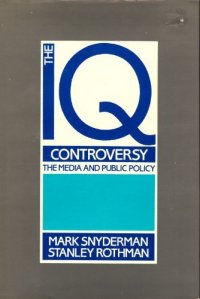
Ebook: The I. Q. Controversy: The Media and Public Policy
Author: Stanley Rothman Mark Snyderman
- Year: 1988
- Publisher: Transaction Publishers
- Language: English
- pdf
Questions about the nature of intelligence and intelligence testing have sparked increasing controversy during the past two decades. The widely held view that intelligence is measureable, and both genetic endowment and environment are key determinants of intelligence, first came under sharp attack during the decade of the 1960s. It was asserted that we do not know what intelligence is, that we do not know how to measure intelligence, and that IQ tests are biased against both minorities and the poor. To determine current opinions among the relevant scientific communities on these issues, the authors used survey research to sample a broad group of experts in educational and developmental psychology as well as those whose specific expertise is intelligence testing. They found that, despite the common understanding to the contrary, most experts continue to believe that intelligence can be measured and that genetic endowment plays an important role in IQ. The central question addressed in this book is why expert opinion and public views toward intelligence and its measurement are so widely divergent. The authors conclude that the public’s view of the IQ controversy has been shaped by inaccurate media coverage; and, more importantly, by changes in the nature of American liberalism as well as the key role of civil rights issues in American life. The increasing influence of new strategic elites in the United States, and the changing role of the mass media, have profoundly affected the character of scientific information communicated to the general public and how it is communicated.